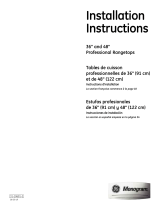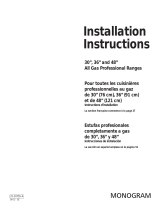
2
Safety Information
BEFORE YOU BEGIN
Read these instructions completely and carefully.
•
IMPORTANT³ Save these instructions for
local inspector’s use.
•
IMPORTANT³Observe all governing
codes and ordinances.
• Note to Installer³Be sure to leave these
instructions with the Consumer.
• Note to Consumer³ Keep these instructions
with your Owner’s Manual for future reference.
• Completion Time³1 to 3 hours.
• Proper installation is the responsibility of
the installer. Product failure due to improper
installation is not covered under the warranty. See
Owner’s Manual for warranty information.
WARNING
This appliance must be properly grounded.
Follow
directions in ”Electric Supply” of this manual. Failure to do so
may result in electric shock.
For Monogram local service in your area,
1.800.444.1845.
For Monogram Service in Canada, call
1.800.561.3344.
For Monogram Parts and Accessories, call
1.800.626.2002.
If you received a damaged rangetop, you should
contact your dealer.
In the Commonwealth of Massachusetts:
• This product must be installed by a licensed
plumber or gas fitter.
• When using ball type gas shut off valves, they
shall be T-handle type.
• A flexible gas connector, when used, must not
exceed 3 feet.
Vent hood Combinations:
It is recommended that these rangetops be installed
in conjunction with a suitable overhead vent hood.
• Install a hood with at least 1200 CFM above a 48”
wide rangetop
.
• Install a hood with at least 600 CFM above a 36”
rangetop.
Due to the high heat capacity of this unit, particular
attention should be paid to the hood and ductwork
installation to assure it meets local building codes.
WARNING:
Do not install this product with an air curtain hood or
other range hood that operates by blowing air down on
the cooktop. This airflow may interfere with operation of
the gas burners resulting in fire or explosion hazard.
Clearances to horizontal surfaces above the range,
measured to the cooking surface are below. Failure to
comply may result in fire hazard.
• Installations without a hood require 48” minimum
to combustibles.
• A custom hood installation with exposed
horizontal combustibles surfaces must have an
Auto-On feature.
• For other installations with a hood, refer to
hood installation instructions for specific hood
clearances.
CAUTION:
These rangetops are extremely heavy. Due to the
weight and size of the rangetop and to reduce the
risk of personal injury or damage to the product:
TWO PEOPLE ARE REQUIRED FOR PROPER
INSTALLATION.
Installation must conform with local codes. In the
absence of local codes, the rangetop must comply
with the National Fuel Gas Code, ANSIZ223.1/
NFPA 54, latest edition and National Electrical
Code ANSI/NFPA 70 latest addition. In Canada,
installation must conform with the current Natural
Gas Installation Code, CAN/CGA-B149.1 or the current
Propane Installation Code, CAN/CGA-B149.2, and
with local codes where applicable. This rangetop has
been design-certified by CSA International according
to ANSI Z21.1, latest edition and Canadian Gas
Association according to CAN/CGA-1.1 latest edition.
Leak testing of the appliance shall be conducted
according to the manufacturer’s instructions.
If sold outside the U.S. and Canada:
WARNING: If you wish to use this
product with Liquefied Petroleum (LP) gas
containing greater than 10% butane, you must
purchase the butane conversion kit
#WB28K10589. To order, please call
1.888.664.8403 or 1.787.276.4051.
Failure to do so
may result in carbon monoxide or fire hazard.






















